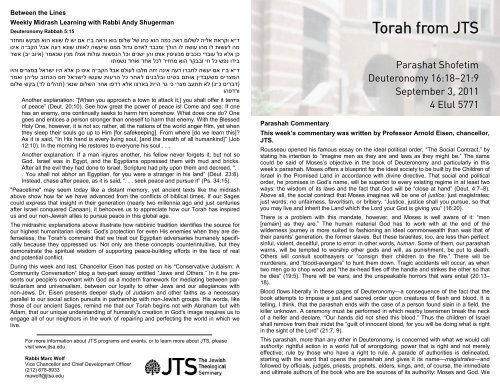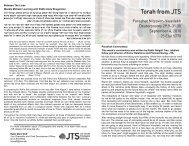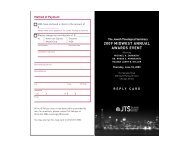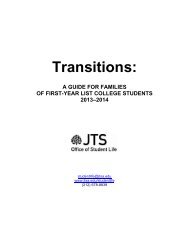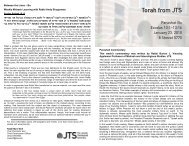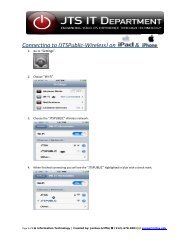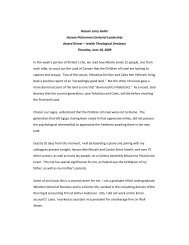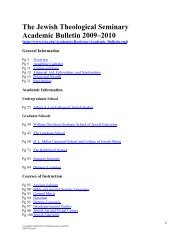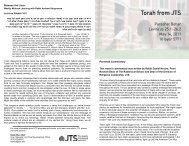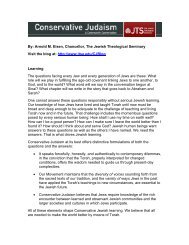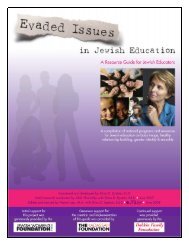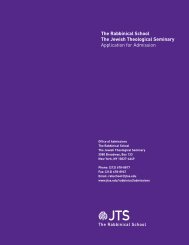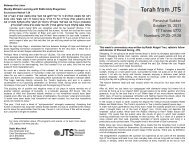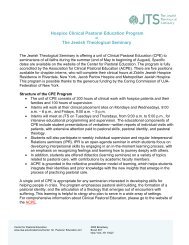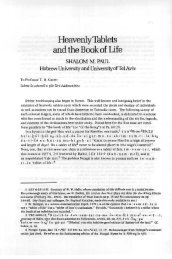Torah from JTS Shofetim 5771
Torah from JTS Shofetim 5771
Torah from JTS Shofetim 5771
Create successful ePaper yourself
Turn your PDF publications into a flip-book with our unique Google optimized e-Paper software.
Between the Lines<br />
Weekly Midrash Learning with Rabbi Andy Shugerman<br />
Deuteronomy Rabbah 5:15<br />
ד״א וקראת אליה לשלום ראה כמה הוא כחו של שלום בוא וראה ב״ו אם יש לו שונא הוא מבקש ומחזר<br />
מ ה לעשות לו מהו עושה ל ו ה ו ל ך ו מ כ ב ד ל א ד ם ג ד ו ל מ מ נ ו ש י ע ש ה ל א ו ת ו ש ו נ א ר ע ה א ב ל ה ק ב ״ ה א י נ ו<br />
כ ן אלא כל עובדי כוכבים מכעיסין אותו והן יש נ י ם ו כ ל ה נ פ ש ו ת ע ו ל ו ת א צ ל ו מ נ י ן ש נ א מ ר (א י ו ב י ב) א ש ר<br />
בידו נפש כל חי ובבקר הוא מחזיר לכל אחד ואחד נשמתו<br />
ד״א ב״ו אם יעשה לחברו רעה אינה זזה מלבו לעולם אבל הקב״ה אינו כן אלא היו ישראל במצרים והיו<br />
ה מ צ ר י ם מ ש ע ב ד י ן א ו ת ם ב ט י ט ו ב ל ב נ י ם ל א ח ר כ ל ה ר ע ו ת ש ע ש ו ל י ש ר א ל ח ס ה כ ת ו ב ע ל י ה ן ו א מ ר<br />
(דברים כ״ג) לא תתעב מצרי כי גר היית ב א ר צ ו א ל א ר ד פ ו א ח ר ה ש ל ו ם ש נ א ׳ (ת ה ל י ם ל ד) ב ק ש ש ל ו ם<br />
ורדפהו<br />
Another explanation: “[When you approach a town to attack it,] you shall offer it terms<br />
of peace” (Deut. 20:10). See how great the power of peace is! Come and see: If one<br />
has an enemy, one continually seeks to harm him somehow. What does one do? One<br />
goes and entices a person stronger than oneself to harm that enemy. With the Blessed<br />
Holy One, however, it is not so; rather, all the nations of the world anger Him, yet when<br />
they sleep their souls go up to Him [for safekeeping]. From where [do we learn this]?<br />
As it is said, “In His hand is every living soul, [and the breath of all humankind]” (Job<br />
12:10). In the morning He restores to everyone his soul . . .<br />
Another explanation: If a man injures another, his fellow never forgets it; but not so<br />
God. Israel was in Egypt, and the Egyptians oppressed them with mud and bricks.<br />
After all the evil they had done to Israel, Scripture had pity upon them and decreed, “. .<br />
. You shall not abhor an Egyptian, for you were a stranger in his land” (Deut. 23:8).<br />
Instead, chase after peace, as it is said, “. . . seek peace and pursue it” (Ps. 34:15).<br />
"Peacetime" may seem today like a distant memory, yet ancient texts like the midrash<br />
above show how far we have advanced <strong>from</strong> the conflicts of biblical times. If our Sages<br />
could express that insight in their generation (nearly two millennia ago and just centuries<br />
after Israel conquered Canaan), it behooves us to appreciate how our <strong>Torah</strong> has inspired<br />
us and our non-Jewish allies to pursue peace in this global age.<br />
The midrashic explanations above illustrate how rabbinic tradition identifies the source for<br />
our highest humanitarian ideals: God's protection for even His enemies when they are defenseless,<br />
the <strong>Torah</strong>'s command that we treat our Egyptian adversaries humanely specifically<br />
because they oppressed us. Not only are these concepts counterintuitive, but they<br />
demonstrate the spiritual wisdom of supporting peace-building efforts in the face of real<br />
and potential conflict.<br />
During this week and last, Chancellor Eisen has posted on his “Conservative Judaism: A<br />
Community Conversation” blog a two-part essay entitled “Jews and Others.” In it he presents<br />
our people's covenant with God as a modern framework for mediating between particularism<br />
and universalism, between our loyalty to other Jews and our allegiances with<br />
non-Jews. Dr. Eisen presents deeper study of Judaism and other faiths as a necessary<br />
parallel to our social action pursuits in partnership with non-Jewish groups. His words, like<br />
those of our ancient Sages, remind me that our <strong>Torah</strong> begins not with Abraham but with<br />
Adam, that our unique understanding of humanity's creation in God's image requires us to<br />
engage all of our neighbors in the work of repairing and perfecting the world in which we<br />
live.<br />
For more information about <strong>JTS</strong> programs and events, or to learn more about <strong>JTS</strong>, please<br />
visit www.jtsa.edu.<br />
Rabbi Marc Wolf<br />
Vice Chancellor and Chief Development Officer<br />
(212) 678-8933<br />
mawolf@jtsa.edu<br />
<strong>Torah</strong> <strong>from</strong> <strong>JTS</strong><br />
Parashat <strong>Shofetim</strong><br />
Deuteronomy 16:18–21:9<br />
September 3, 2011<br />
4 Elul <strong>5771</strong><br />
Parashah Commentary<br />
This week’s commentary was written by Professor Arnold Eisen, chancellor,<br />
<strong>JTS</strong>.<br />
Rousseau opened his famous essay on the ideal political order, “The Social Contract,” by<br />
stating his intention to “imagine men as they are and laws as they might be.” The same<br />
could be said of Moses’s objective in the book of Deuteronomy and particularly in this<br />
week’s parashah. Moses offers a blueprint for the ideal society to be built by the Children of<br />
Israel in the Promised Land in accordance with divine directive. That social and political<br />
order, he promises in God’s name, will be superior to every existing regime in at least two<br />
ways: the wisdom of its laws and the fact that God will be “close at hand” (Deut. 4:7–8).<br />
Above all, the social contract that Moses imagines will be one of justice: just magistrates;<br />
just words; no unfairness, favoritism, or bribery. “Justice, justice shall you pursue, so that<br />
you may live and inherit the Land which the Lord your God is giving you” (16:20).<br />
There is a problem with this mandate, however, and Moses is well aware of it: “men<br />
[remain] as they are.” The human material God has to work with at the end of the<br />
wilderness journey is more suited to fashioning an ideal commonwealth than was that of<br />
their parents’ generation, the former slaves. But these Israelites, too, are less than perfect:<br />
sinful, violent, deceitful, prone to error: in other words, human. Some of them, our parashah<br />
warns, will be tempted to worship other gods and will, as punishment, be put to death.<br />
Others will consult soothsayers or “consign their children to the fire.” There will be<br />
murderers, and “blood-avengers” to hunt them down. Tragic accidents will occur, as when<br />
two men go to chop wood and “the ax-head flies off the handle and strikes the other so that<br />
he dies” (19:5). There will be wars, and the unspeakable horrors that wars entail (20:13–<br />
18).<br />
Blood flows liberally in these pages of Deuteronomy—a consequence of the fact that the<br />
book attempts to impose a just and sacred order upon creatures of flesh and blood. It is<br />
telling, I think, that the parashah ends with the case of a person found slain in a field, the<br />
killer unknown. A ceremony must be performed in which nearby townsmen break the neck<br />
of a heifer and declare, “Our hands did not shed this blood.” Thus the children of Israel<br />
shall remove <strong>from</strong> their midst the “guilt of innocent blood, for you will be doing what is right<br />
in the sight of the Lord” (21:7, 9).<br />
This parashah, more than any other in Deuteronomy, is concerned with what we would call<br />
authority: rightful action in a world full of wrongdoing; power that is right and not merely<br />
effective; rule by those who have a right to rule. A parade of authorities is delineated,<br />
starting with the word that opens the parashah and gives it its name—magistrates—and<br />
followed by officials, judges, priests, prophets, elders, kings, and, of course, the immediate<br />
and ultimate authors of the book who are the sources of its authority: Moses and God. We
need authority desperately, the <strong>Torah</strong> teaches, because our very lives depend upon doing<br />
what is right—and that is difficult for us.<br />
Rabbi Nissim Gerondi (known by his acronym, the Ran; 1310–76) ingeniously addressed this<br />
central conundrum of our parashah. (I cite the selection <strong>from</strong> Gerondi in The Jewish Political<br />
Tradition, edited by Michael Walzer et al, 2000, Vol. I, pp. 156–61.) “Every nation needs<br />
some sort of political organization,” he wrote, and the children of Israel—commanded to build<br />
an ideal society in accordance with God’s commandments—needed a twofold structure of<br />
authority in accordance with Israel’s special mission. The Israelites were, on the one hand, a<br />
people like any other, who had to live with one another in societies and states that required<br />
governance. But they were also blessed with God’s laws and God’s abiding presence. This<br />
unique status mandated the unending search for justice for which Moses calls at the start of<br />
Parashat <strong>Shofetim</strong>. The <strong>Torah</strong>’s laws are designed both to institute an ideal political order<br />
and to “induce the divine effluence to cleave unto us.”<br />
However, R. Nissim continues, these laws may not always be practicable. Following the<br />
strictures prescribed in Tractate Sanhedrin of the Talmud, for example, we can find<br />
murderers guilty of a capital offense only if we can prove with the testimony of two witnesses<br />
that they had been warned about the consequences of the crime before committing it and<br />
knew exactly what they were doing when they murdered. “There is no doubt that this is<br />
required by just law,” Gerondi observes—but if we follow it, murderers would go free! “That is<br />
why God ordered the appointment of a king for the sake of civilization.” The king makes the<br />
system work; “any deficiency regarding political order was corrected by the law of the king.”<br />
“Justice, justice shall you pursue” pertains to the ideal order. “You shall be free to set a king<br />
over you” brings the order down to earth.<br />
Gerondi’s solution to the glaring tension in the parashah is elegant, but it too, of course, falls<br />
prey to a danger that the commentator knew very well, and to which the parashah itself<br />
refers: kings are often corrupted. They may take too many wives, accumulate too much gold<br />
and silver, lead their subjects on a path God wants them never to walk (back to Egypt), or<br />
simply go astray. The king must write a copy of the <strong>Torah</strong>, in the hope that it influences his<br />
behavior (Deut. 17:16–20). Moses is well aware that human beings can spend night and day<br />
reading the <strong>Torah</strong> or even copying it and then disobey its commandments. He knows too that<br />
they might interpret the law in ways God would not sanction. There is no preventing this. And<br />
yet the <strong>Torah</strong> insists that the Israelites try.<br />
Deuteronomy, we might say, is a Zionist book. It wants the Children of Israel to take mitzvot<br />
beyond the sphere of private observance in home or synagogue and attempt to apply them in<br />
the entire social and political order. The justice system must be just, the poor must be taken<br />
care of, the laws and norms of <strong>Torah</strong> must govern education and health care, environmental<br />
policy and foreign policy, treatment of minorities, and distribution of wealth. It is a grand and<br />
demanding vision, the foundation of my own religious Zionism and that of countless other<br />
contemporary Jews.<br />
What then do we make of the State of Israel’s uneven success in living up to these high<br />
standards? We say—prepared for such failings by this week’s parashah—that Israel’s<br />
citizens and leaders are human, operate under pressures of scarcity and war, and are subject<br />
to the same shortcomings as any other nation. The <strong>Torah</strong> judges all lapses <strong>from</strong> justice<br />
severely—and calls on all of us to do better, confident that we can.<br />
What do we do with rabbis or other leaders who, in the name of God and <strong>Torah</strong>, and<br />
sometimes no doubt citing Parashat <strong>Shofetim</strong> as proof-text, forbid Jews <strong>from</strong> employing or<br />
renting homes to Arabs; tell Israeli soldiers they must not obey orders to evacuate<br />
settlements; and teach that children produced by donations of sperm <strong>from</strong> non-Jews are at<br />
risk of inheriting “negative genetic traits that characterize non-Jews” (“Jerusalem Riots<br />
Expose New Rift Between Religious Zionists and Authorities.” Forward, July 15, 2011). We<br />
argue with and oppose such leaders in the name of <strong>Torah</strong> and generations of commentators,<br />
not at all surprised that some Jews will read the text in this way. We bring the full force of<br />
human learning, wisdom, and experience to bear in support of our very different reading and<br />
commitments. And we rejoice that Israel is a democracy rather than a theocracy; it is<br />
governed by civil magistrates and laws rather than clerics or self-proclaimed prophets.<br />
We have a Jewish society and State in the Promised Land once more, thank God, in which<br />
Jews and others, for all our many flaws, continue to pursue justice, fall short, and pursue it<br />
yet again.<br />
The publication and distribution of the <strong>JTS</strong> Commentary are made possible by a generous grant <strong>from</strong><br />
Rita Dee and Harold (z”l) Hassenfeld.<br />
A Taste of <strong>Torah</strong><br />
A Commentary by Rabbi Matthew Berkowitz, director of Israel Programs, <strong>JTS</strong><br />
In the midst of legislating morality on the battlefield, Parashat <strong>Shofetim</strong> teaches, “When in a<br />
war against a city you have to besiege it a long time in order to capture it, you must not<br />
destroy its trees, wielding the ax against them. You may eat of them, but you must not cut<br />
them down. Are trees of the field human to withdraw before you into the besieged city? Only<br />
trees that you know do not yield food may be destroyed” (Deut. 20:19–20). On a cursory<br />
reading of these verses, it is clear that <strong>Torah</strong> is legislating against wanton destruction.<br />
Cutting down fruit-bearing trees for the sake of military triumph is a pyrrhic victory at best.<br />
The soldier is enjoined to think strategically and environmentally. Still, <strong>Torah</strong> goes a step<br />
further in comparing trees to humans and posing its rhetorical question about the nature of<br />
trees. What can we learn <strong>from</strong> this compelling and sensitive legislation?<br />
Professor Ze’ev Falk explains:<br />
This must be read as a question: “how is it that you can wage war against trees?” The<br />
opposite of this can be found in the story of the flood and the overturning of Sodom, where in<br />
both of these narratives God brings an end to the trees of the field and all vegetation as a<br />
result of the crimes of humanity. Prophets also employ this idea of the destruction of nature<br />
as a result of human behavior: “All the trees of the field are sear. And joy has dried up<br />
among men” (Joel 1:12), and also in this case it is possible to interpret it as a question:<br />
“when joy has ceased <strong>from</strong> humanity, must the trees be punished in addition to humans?”<br />
Indeed, it appears that God is waging war against the trees as a result of the transgressions<br />
of humans. Jeremiah explains similarly, “Assuredly, thus said the Lord God: My wrath and<br />
My fury will be poured out upon this place, on man and on beast, on the trees of the field and<br />
the fruit of the soil. It will burn, with none to quench it” (Jer. 7:20). And so our verse demands<br />
more of man than of God—that man should not punish a tree because of his enemy . . .<br />
From here we learn the topic of personal responsibility according to one’s conscience. One<br />
cannot simply justify one’s behavior according to the example of God or a verse <strong>from</strong><br />
Scripture. One must behave in a supreme way and at times act in conflict with religious<br />
sources. Indeed, we must remember the critical difference between the Creator of the world,<br />
who also has the power to destroy creation, and humans who are not given that same<br />
authority to destroy. (Falk, Divrei <strong>Torah</strong> Ad Tumam, 439)<br />
Falk’s “environmental” and philosophical exegesis is powerful. Even though Professor Falk<br />
points to a number of examples of God punishing nature as a result of the reckless behavior<br />
of humans, he demonstrates that <strong>Torah</strong> is commanding us to do better. Imitatio Dei is<br />
unacceptable in the case of destroying fruit-bearing trees at a time of war. We cannot justify<br />
destruction based on the behavior of God (as much as Scripture may tempt us to do so).<br />
Personal accountability to God, <strong>Torah</strong>, and humankind are at the essence of <strong>Torah</strong>’s<br />
pronouncement. It is not surprising then that Rabbi Eleazar ben Hyrcanus teaches, “When a<br />
fruit tree is chopped down, its cry carries <strong>from</strong> one end of the earth to the other, but it is not<br />
heard” (Pirkei DeRabi Eleazar HaGadol 34:19). May we always be attuned to the demands<br />
of morality, accountability, and nature—especially in a time of conflict.<br />
The publication and distribution of A Taste of <strong>Torah</strong> are made possible by a generous grant <strong>from</strong> Sam<br />
and Marilee Susi.


